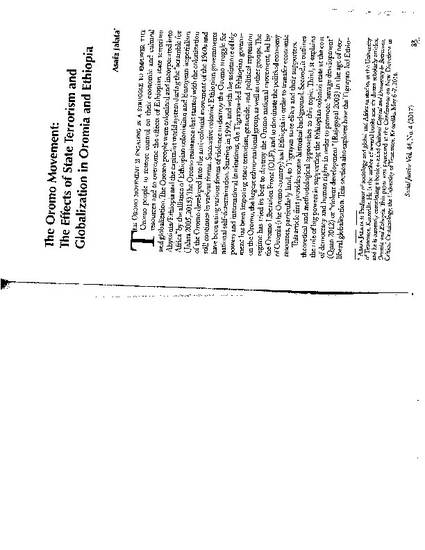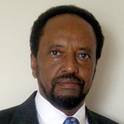
Article
The Oromo Movement: The Effects of State Terrorism and Globalization in Oromia and Ethiopia DOC100218-10022018131506.pdf
Social Justice
(2017)
Abstract
THE OROMO MOVEMENT: THE EFFECTS OF STATE TERRORISM AND GLOBALIZATION IN OROMIA AND ETHIOPIA
The Oromo movement is engaging in a struggle to empower the Oromo people to restore control on their economic and cultural resources and to overcome the effects of Ethiopian state terrorism and globalization. The Oromo people were colonized and incorporated into Abyssinia/Ethiopia and the capitalist world system during the “scramble for Africa” by the alliance of Ethiopian colonialism and European imperialism (Jalata 2005, 2015). The Oromo resistance that started with the colonization of the Oromo developed into the anti-colonial movement of the 1960s and still continues in various forms. Successive colonial Ethiopian governments have been using various forms of violence to destroy the Oromo struggle for national self-determination. Starting in 1992, and with the assistance of big powers and international institutions, the Tigrayan-led Ethiopian government has been imposing state terrorism, genocide, and political repression on the Oromo, the largest ethno-national group, as well as other groups. The regime has tried its best to destroy the Oromo national movement, led by the Oromo Liberation Front (OLF), and to dominate the political economy of Oromia (the Oromo country) and Ethiopia in order to transfer economic resources, particularly land, to Tigrayan state elites and their supporters.
This article first provides some historical background. Second, it outlines theoretical and methodological approaches to this topic. Third, it explains the role of big powers in supporting the Ethiopian colonial state at the cost of democracy and human rights in order to promote “savage development” (Quan 2012) or “violent development” (Rajagopal 2003) in the age of neoliberal globalization. This section also explores how the Tigrayan-led Ethiopian government and its international supporters are using the discourses of democracy, human rights, and economic development at the same time as they terrorize the Oromo and other indigenous peoples and dispossess them of their rights, ancestral lands, and natural resources. Fourth, the article explains how the ongoing peaceful mass protest movement emerged in Oromia, how and why the regime is violently cracking down on protestors, and why the West is facing a political dilemma regarding its support of a government that is openly massacring peaceful protestors to repress dissent. Finally, the piece explores the larger political and economic consequences of the Oromo peaceful protest movement in bringing about a fundamental transformation to the political economy of Oromia and Ethiopia.
Keywords
- The Oromo movement; Oromo nationalism (Oromummaa); state terrorism; globalization
Disciplines
Publication Date
Fall October, 2017
Citation Information
Asafa Jalata. "The Oromo Movement: The Effects of State Terrorism and Globalization in Oromia and Ethiopia DOC100218-10022018131506.pdf" Social Justice Vol. 44 Iss. No. 4 (2017) p. 83 - 105 Available at: http://works.bepress.com/asafa_jalata/92/
